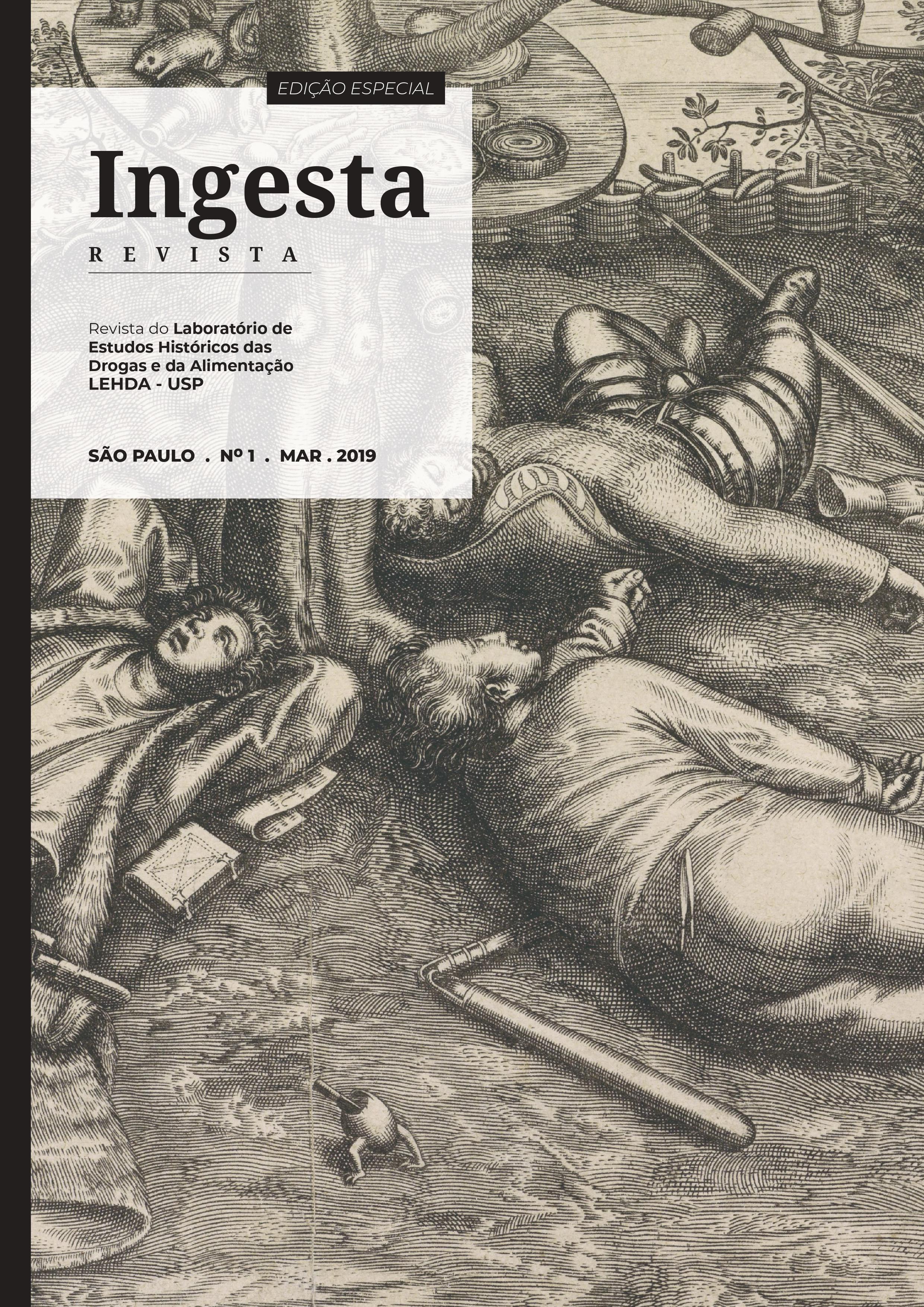Cannabis compassion
symbolic and political dimensions in the management of pain and suffering in Brazil
DOI:
https://doi.org/10.11606/issn.2596-3147.v1i1p41-52Keywords:
Marijuana, Compassion, Therapeutics, PoliticsAbstract
In this article, I intend to discuss an aspect of drug control that is secondary in public debates about prohibition. Just as UN conventions point out that drugs cause pain and suffering because of “drug addiction”, “chemical addiction”, generating illicit trade and “trafficking” violence, the same conventions admit that drugs also continue “indispensable for the relief of pain and suffering”. I will use ethnographic data that I have produced in the United States and Brazil to discuss the therapeutic use of marijuana for handling “pain relief and suffering.” Considering that medical and legal concepts are political constructs, I use the normative regulations on the therapeutic use of marijuana – the Brazilian and the North American – in order to glimpse the political and moral climate of the historical moment in which they are updated. I hope, therefore, to contribute to the elaboration of a “political pharmacopoeia” around marijuana, considering the normative texts as a way of observing how moral, biological, commercial, etc., bonds between human beings and the plant are established.
Downloads
References
BRANDÃO, Marcílio. O “problema público” da maconha no Brasil: anotações sobre quatro ciclos de atores, interesses e controvérsias. Revista Dilemas, Rio de Janeiro, v. 7, n. 4, pp. 703-740, 2014.
CARNEIRO, Henrique. Autonomia ou heteronomia nos estados alterados de consciência. In: LABATE, Beatriz et al. (Orgs.). Drogas e cultura: novas perspectivas. Salvador: Edufba, 2008.
DEANGELO, Steve. The Cannabis Manifesto: a new paradigm for wellness. Berkeley: North Atlantic Books, 2015.
DELMANTO, Júlio. Camaradas caretas: drogas e esquerda no Brasil. São Paulo: Alameda Editorial, 2015.
DUARTE, Luiz Fernando Dias. Pessoa e dor no Ocidente (o “holismo metodológico” na Antropologia da Saúde e Doença). Horizontes Antropológicos, Porto Alegre, ano 4, n. 9, pp. 13-28, 1998.
FIGUEIREDO, Emilio; POLICARPO, Frederico; VERÍSSIMO, Marcos. Planta, droga ilegal e remédio: notas sobre o uso medicinal da maconha no Rio de Janeiro. In: LABATE, Beatriz; RODRIGUES, Thiago (Orgs.). Política de drogas no Brasil: conflitos e alternativas. Campinas: Mercado de Letras; São Paulo, Núcleo Interdisciplinares de Estudos sobre Psicoativos (NEIP), 2018.
FIGUEIREDO, Emilio; POLICARPO, Frederico; VERÍSSIMO, Marcos. A “fumaça do bom direito”: demandas pelo acesso legal à maconha na cidade do Rio de Janeiro. Platô: Drogas e Políticas, São Paulo, v. 1, n. 1, pp. 13-37, 2017.
FIORE, Maurício. Uso de “drogas”: controvérsias médicas e debate público. Campinas: Mercado de Letras/Fapesp, 2007.
FOUCAULT, Michel. Vigiar e punir: nascimento da prisão. Petrópolis: Vozes, 2004.
GÓNGORA, Andrés. Farmacopeia política: una etnografía del antiprohibicionismo y de la lucha por la liberación de la marihuana en Colombia. Tese (Doutorado em Antropologia Social) – Programa de Pós-Graduação em Antropologia Social do Museu Nacional, Universidade Federal do Rio de Janeiro. Rio de Janeiro, 2018.
GÓNGORA, Andrés. Facebook, maconha e a libertação das drogas na Colômbia. In: LABATE, Beatriz; POLICARPO, Frederico (Orgs.). Drogas: perspectivas em Ciências Humanas. Rio de Janeiro: Gramma Editora/Terceiro Nome/NEIP, 2018.
MACRAE, Edward; SIMÕES, Júlio Assis. Rodas de Fumo: o uso da maconha entre camadas médias urbanas. Salvador: Edufba, 2000.
MALOTT, Michael. Medical marijuana: the story of Dennis Peron, the San Francisco Cannabis Buyers Club and the ensuing road to legalization. Scotts Valley: CreateSpace Independent Publishing Platform, 2009.
MUSTO, David. The American disease: origins of narcotic control. Oxford: Oxford University Press, 1999.
OLIVEIRA, Monique Batista. O medicamento proibido: como um derivado da maconha foi regulamentado no Brasil. Dissertação (Mestrado em Divulgação Científica e Cultural) – Instituto de Estudos da Linguagem e Laboratório de Estudos Avançados em Jornalismo da Universidade Estadual de Campinas. Campinas, 2016.
RIBEIRO, Tiago. Governo ético-político de usuário de maconha. Curitiba: Editora Prismas, 2016.
RODRIGUES, Thiago. Tráfico, guerra, proibição. In: LABATE, Beatriz et al. (Orgs.). Drogas e cultura: novas perspectivas. Salvador: Edufba, 2008.
SARTI, Cynthia. A dor, o indivíduo e a cultura. Saúde e Sociedade, São Paulo, v. 10, n.1, pp. 3-13, 2001.
SCHEERER, S. Comentários de Sebastian Scheerer; estabelecendo o controle sobre a cocaína (1910-1920). In: BASTOS, Francisco I.; GONÇALVES, Odair (Orgs.). Drogas: é legal? – Um debate autorizado. Rio de Janeiro: Imago/Instituto Goethe, 1993.
SILVA, Maria de Lourdes. Drogas – da medicina à repressão policial: a cidade do Rio de Janeiro entre 1921 e 1945. Tese (Doutorado em História) – Universidade do Estado do Rio de Janeiro. Rio de Janeiro, 2009.
VARGAS, Eduardo Viana. Fármacos e outros objetos sócio-técnicos: notas para uma genealogia das drogas. In: LABATE, Beatriz et al (Orgs.). Drogas e cultura: novas perspectivas. Salvador: Edufba, 2008.
VARGAS, Eduardo Viana. Uso de drogas: a alter-ação como evento. Revista de Antropologia, São Paulo, v. 49, n. 2, pp. 581-623, 2006.
VELHO, Gilberto. Nobres e anjos: um estudo de tóxicos e hierarquia. Rio de Janeiro: Editora FGV, 1998.
ZANATTO, Rafael. Maconha e Associativismo: modelo para o Brasil? In: COLETIVO DAR. Dichavando o poder: drogas e autonomia. São Paulo: Autonomia Literária, 2016.
ZINBERG, Norman. Drug, set and setting. The basis for controlled intoxicant use. New Haven: Yale University Press, 1984.
Downloads
Published
Issue
Section
License
1. Authors retain the copyright and grant the journal the right of first publication, with the work simultaneously licensed under the Creative Commons Attribution License which allows the sharing of work with acknowledgment of authorship and initial publication in this journal.
2. Authors are authorized to take additional contracts separately, for non-exclusive distribution of the version of the work published in this journal (eg. publish in institutional repository or as a book chapter), with acknowledgment of authorship and initial publication in this journal.
3. Authors are allowed and encouraged to publish and distribute their work online (eg. in institutional repositories or on their personal page) at any point before or during the editorial process, as this can generate productive changes as well as increase the impact and the citation of the published work (See The Effect of Free Access).


